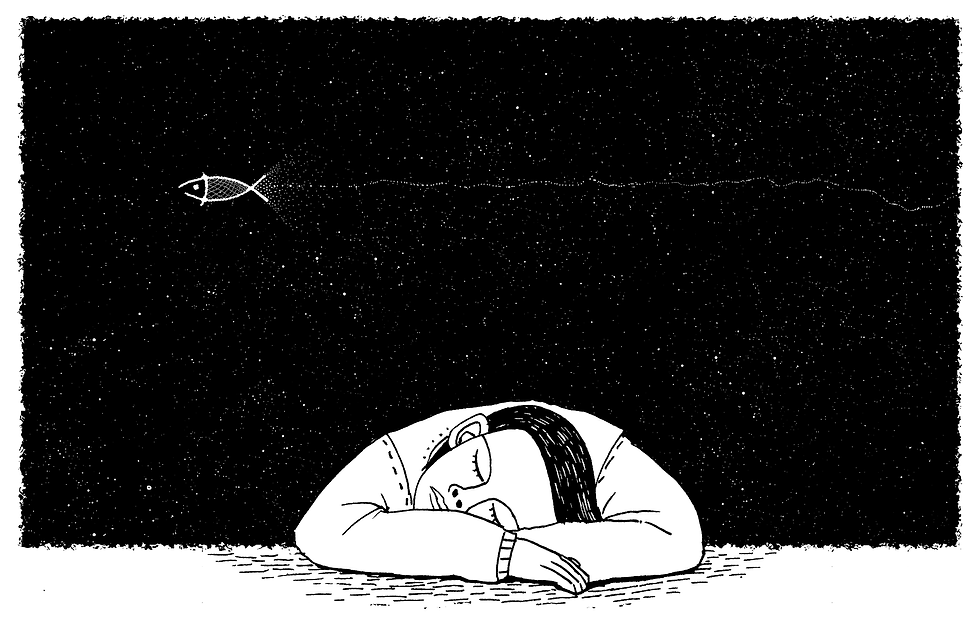Why You Have Been Having Strange Dreams During Quarantine
- Fabiana Peers
- Jul 6, 2020
- 6 min read

Many of us have been experiencing odd dreams when we’ve been going to bed recently. This might seem like a coincidence, but it’s not all in your head! A recent dream survey, conducted by professors at Harvard Medical School, has suggested that the occurrence of vivid dreams has spiked whilst we’ve been in lockdown. But why is this?
How Do We Dream?
Let’s first look at how dreams occur. Dreams take place in Rapid Eye Movement (REM) sleep. This happens about an hour into sleep, in what many refer to as the fifth stage of our sleep cycle. During this stage, a neurotransmitter (a substance released from one neuron to another) called acetylcholine is released from the cholinergic neuron. The release of acetylcholine has been linked to learning and memory. These are functions which are particularly important for the creation of dreams. Another part of the brain that has been found to be very high in activity during REM sleep is the Extrastriate Cortex, an area that is responsible for visual hallucinations. Neurotransmitters such as noradrenaline, which promote vigilance and attentiveness are very low, as we don’t really need these when we’re sleeping. Hence, our responsiveness to the content of our dreams, which can be unusual to say the least, is typically reduced.
Why Do We Dream?

It is still unclear exactly why we dream. Some have suggested that REM sleep is vital for our mental health, as it aids learning and emotional regulation. Others suggest that it has rejuvenative properties. Previously we thought that dreams were expressions of our repressed wishes (a bit of a Freud tribute for those of you who have heard of him). Freud’s theory separates dreams into manifest content (what we recall from them) and what they actually mean (latent content). For example, it was believed that dreaming of falling signified a person about to give into sexual urges in real life. This is a funny idea, but not very likely. Sorry for those of you who have recently had a dream about falling! The leading theory at the moment was proposed by Allan Hobson in 1989. Hobson called his thesis the Activation-Synthesis Theory. This suggests that dreams are just a side effect of our brain making sense of random brain activity and processing our memories. The purpose of dreams is still very much under debate however, this does not take away from their impact.
Why Now?

What is it about quarantine that has been making our dreams so odd? There is no singular reason for why people have been experiencing this, but is most likely a combination of things. Let’s take a look at these.
1. Stress and Anxiety
Due to the events that have transpired from the recent pandemic, it is clear that many of us have been experiencing greater stress and anxiety than we usually would. It has been suggested, that stress and anxiety can often result in negative content in dreams. This would explain why you haven’t been dreaming of sunshine and rainbows recently! Stress and anxiety can also cause us to remember our dreams more. We actually dream every night; it’s just you don’t always remember it! We remember our dreams because, at the end of each 90-minute sleep cycle, we are awake for a few seconds before going into the next cycle. In these few seconds, we encode memories. Therefore, as stress and anxiety has been associated with restless sleep, this gives you more time to encode your dreams and remember them better in the morning.
2. Changed Routines
Many have experienced very vivid dreams during lockdown too. Social Rhythm Theory is one way we can explain this. Social Rhythm Theory argues that our daily routine influences our circadian rhythms. Circadian rhythms can be thought of as our internal body clock, based on external cues such as sunlight, to wake us up in the morning. Many of us have been sleeping in longer recently, which has left our circadian rhythms off-kilter. A survey by Kings College in London found that the majority of people in the UK are getting the same, if not more sleep than usual. As our most intense periods of REM sleep often occur later in our sleep cycle, we have therefore been experiencing more vivid dreams. Furthermore, if you experienced a loss of sleep due to anxiety, our brains can sometimes try and “catch up” by initiating REM sleep, due to the associated health benefits. Therefore, because many have experienced anxiety during this time, and have struggled to get to sleep, we have gone into REM sleep much faster.
3. Lack of Socialisation
The impact of social isolation on dreams is very under-researched. However, some researchers have drawn upon Social Stimulation Theory to explain this connection. Social Stimulation Theory suggests that dreams allow us to improve our social skills through including greater social content than we experience in every-day life. For example, researcher Jarno Tuominen and colleagues found that socially isolated participants dreamed more about their friends and families than non-isolated participants. Therefore, maybe the reason why we’re dreaming of our loved ones is because we’re not able to give them a hug.
4. The News
Although there has yet been no research into how COVID-19 news can impact dreams, previous research has suggested exposure to this, may increase how vivid they are. For example, after the 9/11 attacks, it was found that people experienced more threatening dreams. It was suggested that the more you were exposed to this news, the more threatening your dreams would be. This might explain why we have been dreaming about recent events as, this is all we hear at the moment. This isn’t to say that you should avoid watching the news; we should all be keeping up to date, however over-exposure may explain some of your bad dreams. This is a bit like when you watch a scary film before going to bed and have nightmares (never the best idea!)
How Can You Prevent Bad Dreams?

Whilst many of us wake up laughing at what we dreamt of the night before, to some these dreams can be distressing. Whilst I am no healthcare professional, here’s a few things you can do to decrease bad dreams if you have been suffering, based on previous research.
1. Maintain a consistent time to go to bed and wake up in the morning. If you have a consistent routine, your circadian rhythms won’t be so out of touch. This means that by having a regular time to wake up, there will be less excess time for memory consolidation. This should result in less vivid dreams that are also not as well remembered.
2. Schedule 90 minutes before sleep to wind down (looking at your phone doesn’t count!). If we provide our brains with calming stimulation before bed, it is less likely we will dream of something negative.
3. Write down your dreams. By writing down the content of your dreams, as well as how they make you feel, this can help you decipher why you’re having them. By doing this you can attempt to tackle any potential negative influences in real life. This doesn’t mean looking up on Google what the content of your dreams means; it isn’t always clear cut.
4. Try not to panic if you wake up in the middle of the night. If you find yourself waking up because of a frightening dream, don’t force yourself back to sleep. This can have the negative effect of experiencing another bad dream. This can occur because you are giving your brain negative stimulation before going back to sleep. However, this can also happen because your brain will try to resume interrupted REM sleep for recuperation. Give yourself permission to get up and read a book. This will calm you down a bit and mean your next sleep cycle is hopefully less disruptive.
5. Limit your exposure to stressful media. As we explored before, the news can often have a negative impact on sleep and dreams. Just like a scary movie, maybe don’t watch the news before going to bed.
I hope you enjoyed this article. If you would like to learn more about sleep and dreams, please click on this link. If you have been having bad dreams during quarantine, you will hopefully now know what you can do to reduce them and know that you’re not the only one! Don’t forget to subscribe on the homepage to keep up to date. Happy learning!


I'm glad you enjoyed it!
So helpful and clear! Thank you, I loved reading this!